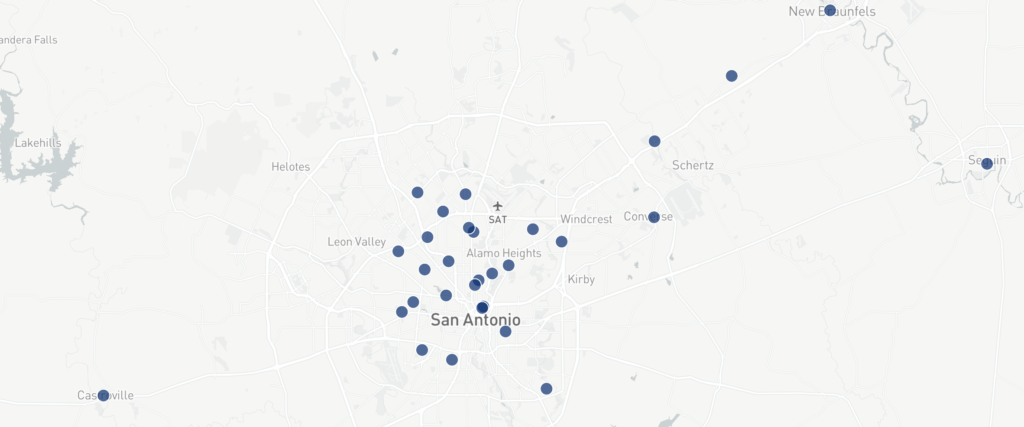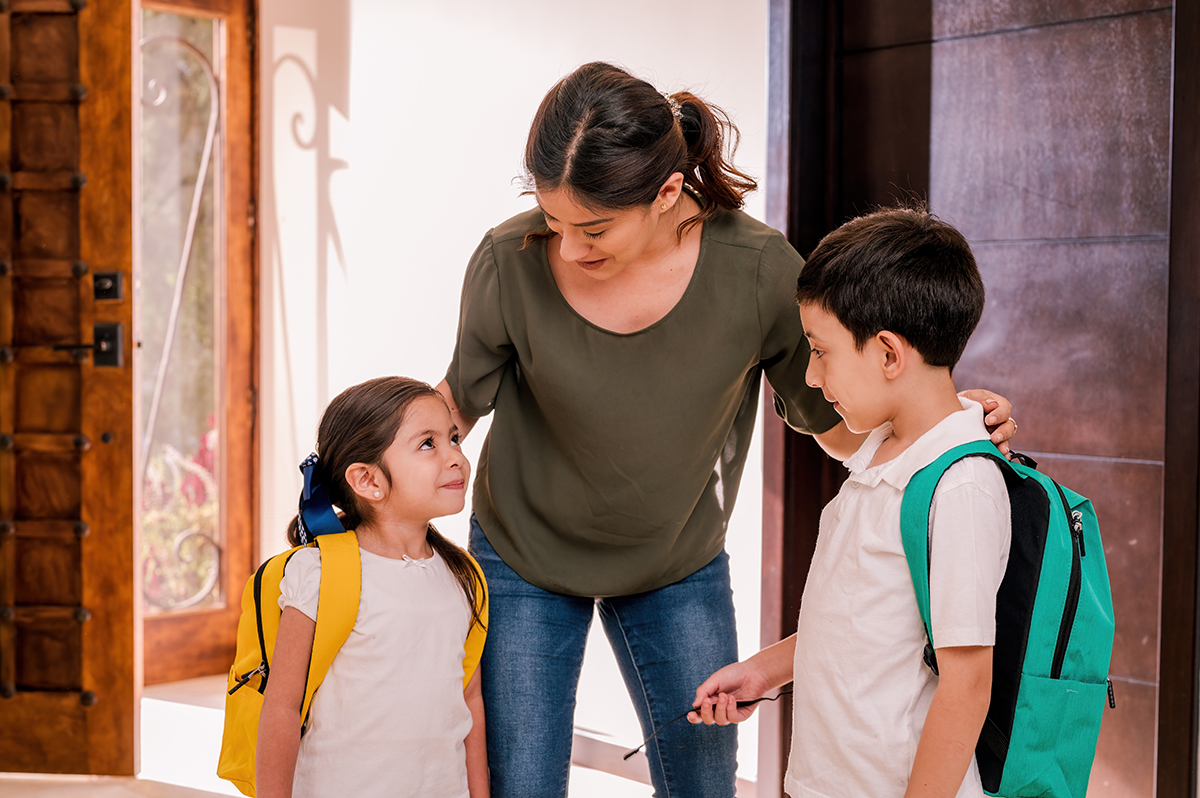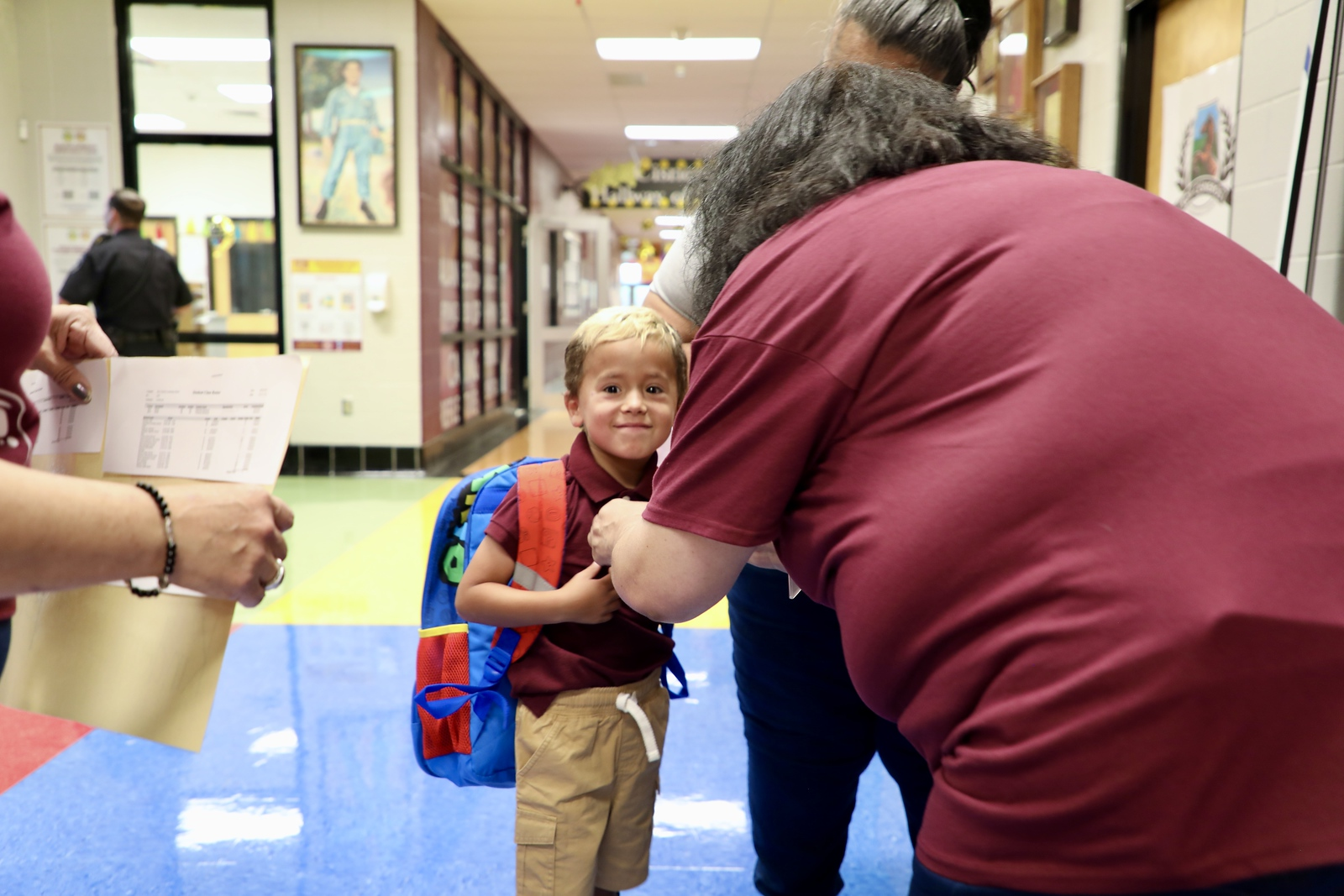Catholic Schools in San Antonio have a long tradition of high quality education, as well as faith and character formation. In support of families looking to learn more about early childhood education at Catholic schools, we have prepared a guide to Catholic schools that offer pre-K in the Archdiocese of San Antonio to help you learn more about them, as well as discover how to enroll your children for the school year or a summer program.
About Catholic Schools in San Antonio
Catholic schools are an essential part of the history of education in San Antonio. The first Catholic school in San Antonio, Ursuline Academy (now the Southwest School of Art), was founded in 1851; soon thereafter, Central Catholic High School was founded in 1852. Guided by the Archdiocese of San Antonio, Catholic schools educate students through “higher thought and prayer.”
What are the distinctive features of Catholic school culture? Around each school, families, teachers, and students form a Christ-centered community, expressed through acts of service. The schools partner with parents and parishes, and students engage in their local communities and beyond.
All of Catholic schools in the Archdiocese of San Antonio are fully accredited by the Texas Catholic Conference of Bishops Education Department (TCCB ED), which is part of the Texas Private School Accreditation Commission (TEPSAC) and recognized by the state’s Texas Education Agency (TEA).
The Catholic Preschool Experience
The earliest points of entry into Catholic schools are early childhood programs, for children as young as 18 months old, and preschool programs, for kids who are 3–4 years old. There are 28 Catholic preschool programs across the city of San Antonio and surrounding communities, including Castroville, Converse, Del Rio, Floresville, Fredericksburg, Kerrville, New Braunfels, Pleasanton, Seguin, Selma, and Uvalde. The Archdiocese of San Antonio’s Catholic Schools website includes a school locater to help you find a campus near you.
Research has shown that a high-quality preschool experience has positive effects on the brain architecture and development in a child’s early years,1 particularly when the program is focused on supporting a “range of early skills, including cognitive (early language, literacy, math), social (theory of mind, empathy, prosocial), persistence, attention, and self-regulation and executive function skills (the voluntary control of attention and behavior).”2
The Catholic preschool experience supports the whole child through the development of these early skills, which are critical through the preschool years and in preparation for the elementary school experience.
Elements of Catholic Preschool Programs
Though each Catholic preschool has varying levels of specials and added programming, the majority of pre-K3 and pre-K4 programs offer these elements:
- Weekly mass as part of the preschool experience.
- The incorporation of play-based activities, with 25 percent of schools describing their program as “play-based.”
- The incorporation of authentic materials (i.e., real acorns vs. plastic) in the preschool program.
- A lower student-to-teacher ratio than state licensing requirements (15:1 for age 3 and 18:1 for age 4).
- Minimum teacher education requirement of an associate’s degree or teacher certification, with the majority requiring at least a bachelor’s degree.
- Ongoing professional development opportunities for teachers.
- At least one hour of outside unstructured time plus outdoor learning activities.
- After-school care until 5:30 or 6:00 PM is available at all but one of the Catholic preschools in the region. Some offer full day and half day options
- Summer programs are available at 11 out of 28 schools in the region.
- Staff who are trained in CPR and pediatric first aid are on campus daily.
- A hot lunch option.
- Other highlights: Spanish immersion, Montessori, collaboration with parents (aligning with Canon Law as true partners in child’s education), focused reading curriculum, music, Spanish, PE, technology, kindergarten readiness, and a loving/caring community.
Catholic Schools Lay a Foundation for Success
Overall, Catholic Schools have a track record of success, especially for students of color. Data show that 99 percent of Catholic School students graduate from high school on time; of those, 86 percent attend college. A black or Latino child is 42 percent more likely to graduate from high school and 2.5 times more likely to graduate from college if he or she attends a Catholic school. They are also less likely to be incarcerated.
Students who grow up in Catholic Schools are more likely to keep their Catholic identities as adults through daily prayer, church attendance, and charitable giving. Also, studies show that Catholic School graduates are more civically engaged and more likely to vote than peers who went to other schools. As adults, they are more likely to serve their communities.
Summer programs are happening now, and many campuses have openings for new students. Visit the preschool listing at SACatholicSchools.org, and you’ll see icons for all the campuses with summer programs available. Then, contact each campus to schedule a school tour.
To read more about Catholic Schools in the news, we recommend that you click on the articles linked at the bottom of this post, as well as additional links in our broader guide to Catholic Schools in San Antonio. Also, we invite you to join the San Antonio Charter Moms discussion group on Facebook and ask questions; the group includes current Catholic school families with young children who can comment with answers based on their own experiences.
Catholic Schools in San Antonio that Offer Preschool
As of the 2020–21 school year, there are 28 schools in the Archdiocese of San Antonio that offer preschool. All of these campuses are coed.
- Blessed Sacrament Catholic School: 600 Oblate Dr., San Antonio, TX 78213 (map); 210-824-3381; grades PK4–8
- Holy Name Catholic School: 3814 Nash Blvd., San Antonio, TX 78223 (map); 210-333-7356; grades PK3–8
- Holy Spirit Catholic School: 770 W. Ramsey Rd., San Antonio, TX 78216 (map); 210-349-1169; grades PK3–8
- Little Flower Catholic School: 905 Kentucky Ave., San Antonio, TX 78201 (map); 210-732-9207; grades PK4–8
- Mount Sacred Heart Catholic School: 619 Mount Sacred Heart Rd., San Antonio, TX 78216 (map); 210-342-6711; grades PK3–8; the Montessori program serves students as young as 2½ years old
- Notre Dame Catholic School: 907 Main St., Kerrville, TX 78028 (map); 830-257-6707; grades PK3–8
- Our Lady of Perpetual Help School: 16075 N. Evans Rd., San Antonio, TX 78154 (map); 210-651-6811; grades PK3–8
- Our Lady of Grace Catholic School: 626 Market St., Pleasanton, TX 78064 (map); 830-569-8073; PK3–5
- Sacred Heart School: 209 E. Greenwood St., Del Rio, TX 78840 (map); 830-775-3274; grades PK3–8
- Sacred Heart School: 1007 Trail St., Floresville, TX 78114 (map); 830-393-2117; grades PK3–6
- Sacred Heart School: 401 W. Leona St., Uvalde, TX 78801; 830-278-2661 (map); grades PK3-6
- St. Anthony Catholic School: 205 W. Huisache Ave., San Antonio, TX 78212 (map); 210-732-8801; grades PK3–8; read more in this guest post
- St. Gregory the Great Catholic School: 700 Dewhurst Rd., San Antonio, TX 78213 (map); 210-342-0281; grades PK3–8
- St. James Catholic School: 507 S. Camp St., Seguin, TX 78155 (map); 830-379-2878; grades PK2–8
- St. James the Apostle Catholic School: 907 W. Theo Ave., San Antonio, TX 78225 (map); 210-924-1201; grades PK3–8
- St. John Berchmans Catholic School: 1147 Cupples Rd., San Antonio, TX 78226 (map); 210-433-0411; grades PK3–8
- St. John Bosco Catholic School: 5630 W. Commerce St., San Antonio, TX 78237 (map); 210-432-8011; grades PK3–8
- St. Louis Catholic School: 607 Madrid St., Castroville, TX 78009 (map); 830-931-3544; grades PK3–5
- St. Luke Catholic School: 4603 Manitou Dr., San Antonio, TX 78228 (map); 210-434-2011; grades PK4–8
- St. Mary Catholic School: 202 S. Orange St., Fredericksburg, TX 78624 (map); 830-997-3914; grades PK3–8
- St. Mary Magdalen Catholic School: 1700 Clower St., San Antonio, TX 78201 (map); 210-735-1381; grades PK3–8; read more in the enrollment guide
- St. Matthew Catholic School: 10703 Wurzbach Rd., San Antonio, TX 78230 (map); 210-478-5099; grades PK4–8
- St. Monica Catholic School: 515 North St., Converse, TX 78109 (map); 210-658-6701; grades PK3–8
- St. Paul Catholic School: 307 John Adams Dr., San Antonio, TX 78228 (map); 210-732-2741; grades PK4–8
- Sts. Peter and Paul Catholic School: 198 W. Bridge St., New Braunfels, TX 78130 (map); 830-625-4531; grades PK3–8
- St. Peter, Prince of the Apostles School: 112 Marcia Pl., San Antonio, TX 78209 (map); 210-824-3171; ages 18 months to 3 years and grades PK3–8
- St. Pius X Catholic School: 7734 Robin Rest, San Antonio, TX 78209 (map); 210-824-6431; grades PK3–8
- St. Thomas More Catholic School: 4427 Moana Dr., San Antonio, TX 78218 (map); 210-655-2882; ages 18 months to 3 years and grades PK3–8
Like all private schools in Texas, Catholic schools in San Antonio do not need to administer state mandated standardized tests, so there is no accountability data or school report cards to share. For more information about enrolling at private schools in San Antonio, see “Your Guide to San Antonio Private Schools: 2020–21” from San Antonio Magazine. For more information about early childhood programs at charter schools in San Antonio, see our guide. In addition, please join the San Antonio Charter Moms discussion group on Facebook to post questions about preschools and search previous discussions about San Antonio Catholic schools.
Early childhood and preschool programs are a great beginning to a Catholic education. We hope this guide helps you learn more about preschool at Catholic schools in the Archdiocese of San Antonio and discover how to enroll your children at one of these campuses.
Charter Moms Chats
Watch Claudia Gonzalez, Director of Enrollment and Advancement, and Amy Hudson, Assistant Superintendent of Academics, both with the Archdiocese of San Antonio, and Elizabeth Cantu, Pre-K 4 Teacher at St. Pius X Catholic School, speak with Inga Cotton on Charter Moms Chats on June 16, 2021 at 4:00 PM Central live on Facebook and YouTube.
Claudia Gonzalez is the Director of Enrollment and Advancement for Catholic Schools at the Archdiocese of San Antonio.
Amy Hudson, a seasoned, passionate educator, is the Assistant Superintendent of Academics for the Archdiocese of San Antonio. She has taught in Dallas ISD, Northside ISD, and the Archdiocese of San Antonio. She has researched and developed a literacy program which has successfully been implemented in many school districts across the United States, and most recently has been doing contract work with educational publishing companies and in schools across the country as a consultant to help improve teaching and learning.
Elizabeth Cantu teaches pre-K 4 at St. Pius X Catholic School in San Antonio.
Read More About Preschool at San Antonio Catholic Schools
- “St. Anthony Catholic School: A Fresh Look at Catholic Education,” Patricia L. Ramirez, San Antonio Charter Moms, March 30, 2021
- “Guide to Enrolling in Catholic Schools in San Antonio for 2021–2022,” San Antonio Charter Moms, January 19, 2021
- “Preschool teacher takes her classroom to students’ yards,” Katie Kindelan, Good Morning America, May 6, 2020
- “San Antonio Pre-K teacher takes classroom to her students’ yards, driveways,” Erica Hernandez, KSAT, May 4, 2020
Additional Sources
1 National Scientific Council on the Developing Child (2007). The Science of Early Childhood Development: Closing the Gap Between What We Know and What We Do. Retrieved from www.developingchild.harvard.edu.
2 Hirokazu Yoshiwaka et al., Investing in Our Future: The Evidence Base on Preschool Education, Foundation for Child Development, 2013.













